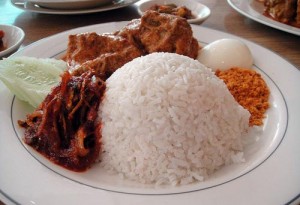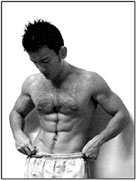
Rice is a staple food in many Muslim diets
I came across an interesting nutritional journal earlier this week that unveiled the mystery behind weight gain during the month of fasting (Ramadan).
During the fasting period, many would assume that there would be a significant weight loss because meals can only be consumed before sunrise and after sunset. However, the results of a study done by King Abdulaziz University of Saudi Arabia revealed that Saudi families actually experienced weight gain during Ramadan.
One of the possible reasons for this reported weight gain can be attributed to their diets being high in simple carbohydrates (rice and dates) and rich in fat. Another reason being the lack of exercise during this period as well.
This is further proof that starving yourself for weight loss does not work and its definitely not the quickest way to lose weight!
Our bodies are built to survive!
During fasting month, or even when you are going through a diet, your body interprets the reduced calorie intake as a threat to its own well being. Your body then goes into what we call “survival” mode. So when you skip a meal for the first one or two days, your body will experience a slight weight loss. But as part of the survival mode, your body will adapt itself to the reduced calorie intake in order to help you survive. This is when the weight loss stops. Some of the adjustments that you body will do include:
1. Reducing your metabolism
2. Storing more fat and burning muscle for fuel
So imagine you are driving a car with just a little bit of petrol left. What would you do to ensure maximal mileage for your remaining petrol till you reach the next gas station? Maybe you turn off your air conditioning and your stereo. You wind up your windows to reduce drag on your vehicle. You drive at a more constant speed. The same goes for your body when it feels like theres less food coming in. It gets rid of all the unnecessary luxuries like your muscles and stores more fat for energy.
What you can do to avoid weight gain during Ramadan
While its impossible to maintain the same eating habits and frequency during Ramadan, there are a couple of things that you can do to minimize the effects of weight gain.
- Consume more protein rich food. Protein burns hotter in your body and will take a longer time to digest. This will ensure that you stay satiated longer after your meal.
- Add more fiber in your diet. Consume more multigrain bread, fruits and fibrous vegetables. Fiber has been known to aid fat loss. So go ahead and eat as many servings of vegetables as you can during your sunrise meal.
- Avoid simple carbohydrates altogether. A lot of our Asian staple food involves rice. Like all other simple carbohydrates, its main job is to provide instant energy for our bodies. But during Ramadan where your energy output is reduced, you don’t really need to consume so much carbohydrates. Any excessive carbohydrates will get stored as fat! This is why it is really a bad idea to consume rice and white potatoes especially during Ramadan especially during your sunset meal. Opt for rice substitutes such as sweet potatoes, brown rice and oats instead.
- Continue with some light exercises. Muscles are a high maintenance resource in your body. A pound of muscle burns five times more calories than fat. When your muscles are not being engaged or used actively, your body will be very happy to get rid of it to ensure your “survival”. So what you want to do, is to prove to your body that you still need those muscles by continuing to exercise. While energy levels may be low during this period, you can try to do some basic calisthenics like pushups, bodyweight squats and burpees to maintain your metabolism and prevent muscle loss.
Try adopting the four tips above during the fasting month and see for yourself how you will be able to maintain your hard earned muscle and prevent weight gain.
There are more useful fat burning strategies on how to get slim included in my 10 Minute Corporate Fat Loss Plan that will ensure that you burn at up to 5 pounds in the first week and 3 pounds a week there after.
Source:
http://www.nutritionj.com/content/10/1/84/abstract




 Daniel Ho is a Certified Sports Nutritionist (USSA), Certified Personal Trainer (ACE) and fitness enthusiast with over 10 years of training experience. At the time of writing, Daniel is working as a Product Manager for a large Multi-National Corporation. Having worked in the
corporate environment for over seven years with a
typical nine to five (sometimes longer) schedule, he
understands the struggle that most people have in
order to stay fit and healthy...
Daniel Ho is a Certified Sports Nutritionist (USSA), Certified Personal Trainer (ACE) and fitness enthusiast with over 10 years of training experience. At the time of writing, Daniel is working as a Product Manager for a large Multi-National Corporation. Having worked in the
corporate environment for over seven years with a
typical nine to five (sometimes longer) schedule, he
understands the struggle that most people have in
order to stay fit and healthy...